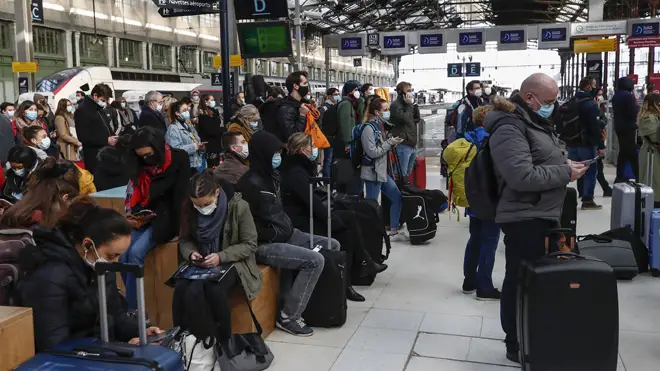
Oli Dugmore 4am - 7am
20 March 2021, 09:17 | Updated: 21 March 2021, 11:31

France and Poland are starting new partial lockdowns this weekend over concerns about a third wave of Covid-19.
Germany is also on the brink of imposing tougher coronavirus restrictions next week after another sharp rise in infections.
Chancellor Angela Merkel has said the German government will have to apply what she calls an 'emergency brake' and re-impose lockdown measures. The country has warned of 'exponential growth' in Covid infections.
The new four-week partial lockdown has come into effect for millions of people across France.
It is the latest strict measure brought in among a growing list of countries in Europe which have been forced to respond to signs of a third wave of coronavirus infections.
The start of lockdown in Paris sparked an exodus of people trying to leave locked-down regions for areas with no restrictions in place.
Poland has also imposed a lockdown which consists of the closure of non-essential shops, hotels, cultural and sporting facilities for the next three weeks.
University of Leicester clinical virologist Dr Julian Tang told LBC: "A third wave in Europe will be more of a problem there than here because the top end of the UK population has now been vaccinated. Europeans don't have that protection yet because of the slow vaccine rollout. I think the third wave could still be quite bad there."

Boris Johnson receives first dose of AstraZeneca vaccine
Some 35,000 new cases were reported nationwide in France on Thursday.
The numbers have steadily increased in recent weeks, and around 250 people are dying with Covid-19 each day.
The new lockdown measures for Paris and several other regions will see non-essential shops close and restrictions on travel.
Its nationwide curfew from 6pm to 6am - which has been in place for two months - will now begin an hour later.
Prime Minister Jean Castex said France was facing a "third wave" of the pandemic, adding the new measures will last for four weeks.
There have been 4,111,105 confirmed Covid-19 cases in France so far and 90,893 deaths, according to the World Health Organisation.
In Germany, restrictions were been slowly being eased, with bars, pubs and restaurants allowed to resume outdoor service from March 22 in areas with low case numbers.
Hair salons reopened on March 1, while some museums and galleries welcomed back visitors on March 8.
Some non-essential retail has also returned ahead of a wider reopening on March 28.
Unlike the UK, people are not allowed to wear cloth face coverings in shops or on public transport. Instead they must use either disposable surgical masks or filtering face piece respirator masks such as the FFP2.
There have been 2,629,750 confirmed cases of coronavirus in Germany, with 74,358 deaths, the WHO said.
However the country is facing the prospect of new tough restrictions as the third wave sweeps Europe.
An overnight nationwide curfew is expected to remain in place across Spain until early May.
However, restrictions vary in each of the country's 17 regions.
There have been 3,206,116 confirmed cases of coronavirus in Spain and 72,793 deaths.
In Italy, a nationwide nightly curfew remains in place preventing people from leaving home except for work, emergency or health reasons.
The country is divided into red, orange, yellow and white zones, depending on local infection rates.
In areas designated "red zones" - where the toughest measures are applied - non-essential shops are closed, while restaurants and cafes can only serve takeaway or delivery.
Bosnia's capital has been forced to tighten measures against the new coronavirus as authorities struggle to cope with rising infections and a spike in deaths caused by Covid-19.
Sarajevo has mourned dozens of victims this month, as daily new cases in Bosnia rose from just a few hundred to more than 1,700 this week.
Twenty-one new deaths were reported in the capital on Friday alone.
The latest Government data up to March 18 shows that of the 28,274,802 jabs given in the UK so far, 26,263,732 were first doses - a rise of 528,260 on the previous day.
Some 2,011,070 were second doses, an increase of 132,016.
Listen & subscribe: Global Player | Apple Podcasts | Google Podcasts | Spotify
Last night, Prime Minister Boris Johnson received his first dose of the AstraZeneca jab.
He was vaccinated at St Thomas' Hospital.
The Prime Minister confirmed he would be receiving the Oxford/AstraZeneca vaccine at a press briefing on Thursday in which he dismissed concerns it was linked to blood clots and told the nation it was "safe".
Mr Johnson received the jab shortly after 6.30pm.
With his left sleeve still rolled up, he gave a double thumbs up to mark the occasion.
The vaccine was administered by nurse and clinical pod lead, Lily Harrington, at Westminster Bridge Vaccination Centre at St Thomas' Hospital in central London.